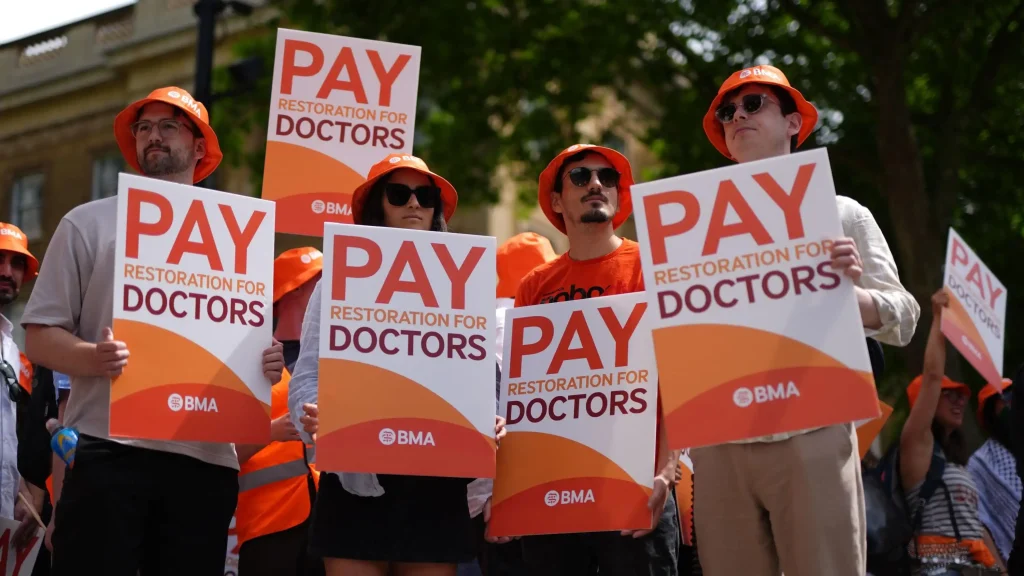On Friday, July 25, 2025, thousands of UK resident doctors launched a five-day strike, escalating a long-standing pay dispute with the government.
Picket lines formed outside hospitals after last-minute negotiations collapsed late Thursday, failing to reach an agreement.
The strike follows a 22.3% pay rise offer over two years, accepted in September 2024, shortly after Prime Minister Keir Starmer’s Labour government took office.
However, resident doctors—those below consultant level—argue this increase fails to address the 21% real-term pay erosion they’ve faced since 2008.
Why Are Doctors Striking?
The British Medical Association (BMA), representing the doctors, cites significant pay erosion over the past two decades as the primary reason for the strike.
In a joint statement, BMA resident doctors committee co-chairs Melissa Ryan and Ross Nieuwoudt emphasized:
“We’re not working 21% less hard, so why should our pay suffer?”
The doctors feel compelled to act to restore their pay to pre-2008 levels, adjusted for inflation.
Last year’s strikes, which disrupted tens of thousands of NHS appointments and treatments, underscored similar frustrations as inflation soared, impacting both public and private sector workers.
Government Response and Concerns
Prime Minister Keir Starmer has urged doctors to reconsider, warning that the strike “will cause real damage” to patients and the already strained National Health Service (NHS).
In an op-ed for The Times, Starmer wrote:
“Launching a strike will mean everyone loses. Our NHS and your patients need you.”
He cautioned that the action risks “blighting lives” and urged doctors not to follow the BMA “down this damaging road.”
Health Minister Wes Streeting echoed this sentiment in a letter published in The Telegraph, stating the government “cannot afford to go further on pay this year.”
This follows the previous Conservative government’s refusal in 2024 to meet the BMA’s demand for a 35% “pay restoration” to offset inflation over the past decade.
Impact on the NHS and Patients
The strike is expected to exacerbate pressures on the NHS, which is already grappling with long waiting lists and resource constraints.
Last year’s walkouts led to significant disruptions, including:
- Tens of thousands of canceled appointments
- Delayed treatments and surgeries
- Increased strain on hospital staff and resources
As the five-day strike unfolds, patients face further delays, raising concerns about the broader impact on healthcare delivery.
Context of Recent Pay Agreements
Since taking power, the Labour government has worked to resolve several public sector disputes.
In 2024, they secured pay deals with various groups, including a 15% pay rise over three years for train drivers, which drew criticism from the Conservative opposition.
However, the doctors’ ongoing dispute highlights the challenges of balancing fiscal constraints with workforce demands in the public sector.
Read Also: Ghana Police Hospital Fix Mass Burial for Unclaimed Bodies
What’s Next?
With no immediate resolution in sight, the strike underscores deep-rooted tensions between the government and healthcare professionals.
The BMA remains firm in its call for fair compensation, while the government emphasizes the need for fiscal responsibility and patient care continuity.
As the NHS braces for further disruption, all eyes are on whether both sides can find common ground to prevent future walkouts.























